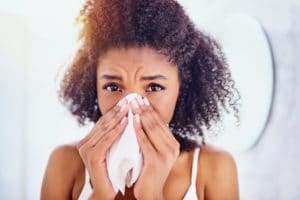
A recent study completed by Ye Yuan of the Technical University of Munich finds that allergy season is beginning earlier and lasting longer.
This is primarily caused by an upshot in climate change. As global temperatures increase, flowers begin to bloom earlier each year and produce pollen as much as two days earlier every year. In fact, over the past three decades pollen has emerged twenty days earlier overall.
Additionally, it is very likely that the pollen trends will continue, “as climate change, including rising temperature and increasing CO2 levels consistently contribute to pollen season and pollen transport” (Yuan). As climate change continues to change the current state of the world, it also brings serious health implications.
Not only does this affect those with seasonal allergies, but also becomes a health hazard with those with severe asthma or allergy-induced asthma.
Allergies, or allergenic responses, happen when the body registers a harmless substance in the body as a threat and creates an inflammatory response to react to it.
This causes inflammation in the nose, eyes, throat, and lungs. This can lead to asthmatic symptoms, or allergy-induced asthma. While it is hard to avoid the outdoors, it is important to reduce your exposure to triggers for your health and safety. Below are ways to reduce your exposure to allergy triggers:
Avoid allergy triggers, especially inside your home: While the outdoors are unavoidable, it is important to avoid bringing these allergens into your home where they may linger around in fabrics in the household (i.e. couches, carpet, linens, etc.). In order to do so, change clothes when coming from outside, wash the clothes, and rinse off your body.
Additionally, delegate any household chores like gardening, lawn mowing, and weed pulling to avoid being exposed to any environmental irritants. If you are going to do any outdoor work, consider wearing a mask and safety goggles to shield your eyes, nose, and mouth.
Keep the inside of your house clean and purified: What is inside your home is easier to control than what is on the outside. During allergy season, it’s particularly important to keep the interior of your house clean.
Substances like dust can be a common irritant that triggers allergies but is simple to prevent through dusting several times a week.
Additionally, invest in an air purifier for the house or at least in the most-used areas of your home. This will help keep the air consistently purified and reduce allergens. Finally, make sure to vacuum inside the home to remove any allergens lingering in the floors, especially carpeted ones.
Allergens can be tracked in through shoes and clothes, so make sure to keep floors, rugs, and carpets clean to help with allergies.
Rinse your sinuses: This is an easy and affordable at-home solution that can help clear sinuses and airways. According to Mayo Clinic, this can easily be done by using a squeeze bottle or neti pot and distilled/purified water. Insert into the nasal pathways and use to rinse out your sinuses of any mucus or allergens.
As spring progresses and turns into summer, implement these simple tactics to help reduce allergens in your space or remedy them as they come.
Along with consulting with an allergy and asthma specialist, keeping your spaces clean and airways clear can be essential in preventing allergy-induced asthma.
However, always make sure to keep your inhaler ready and accessible (if needed) and take any OTC or prescribed medications to help with allergies.








